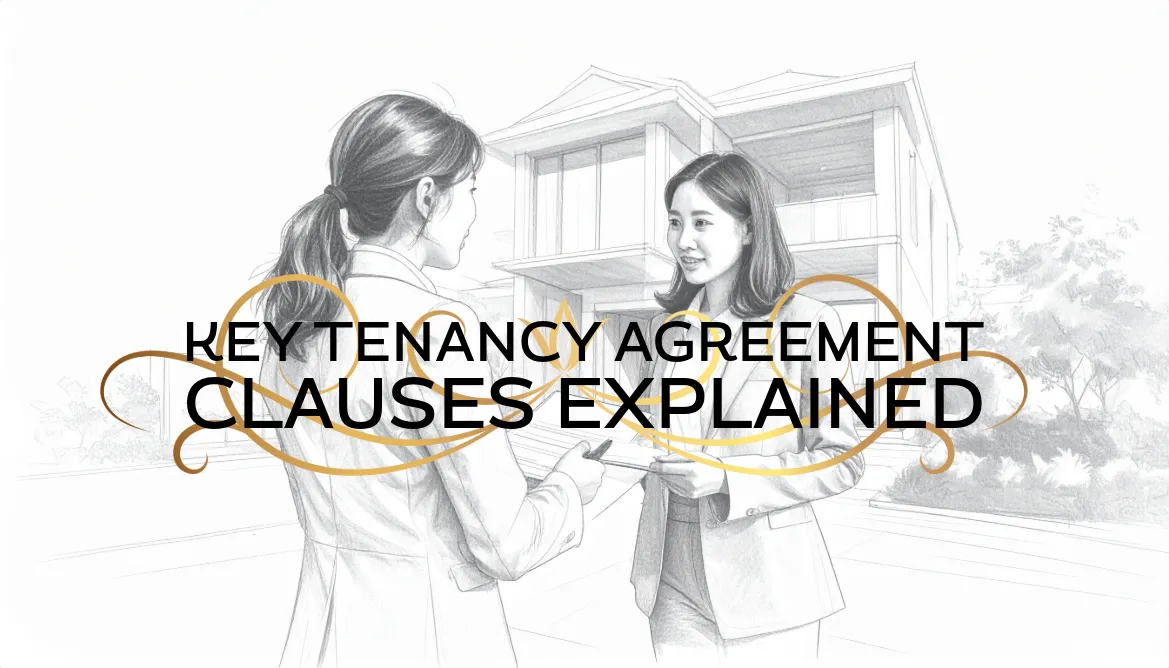A rented home in Singapore comes with obligations for both landlords and tenants. A Tenancy Agreement (TA) will confirm the relationship between the landlord and tenant. It will set out clear rights and obligations (of landlords and tenants) and processes (eg. making repairs) during the lease period. However, not all clauses are created equal. It will prevent any disagreements and disputes in the future.
Why Tenancy Agreements Matter.
A TA is more than just a formality—it’s a legal document. Rental agreements disclose property specifics and conditions that the tenant requires before renting. It will safeguard your interests when trouble arises, from busted appliances to lease termination. Most people assume these agreements are not a big deal, but nothing should be signed without careful review of each clause.
Let’s look at some of the important clauses in a Singapore tenancy agreement.
1. Diplomatic Clause.
This clause protects expatriates. The tenant is allowed to terminate the lease prematurely – ​typically at the 12-month mark on a 24-month lease – if they are transferred overseas permanently. Most diplomatic clauses need evidence of job relocation and two months’ notice.
Usually, tenants who use this clause pay a pro-rated agent fee reimbursement based on the remaining lease term. Always ask for a receipt of the landlord’s agent commission to ensure fairness.
2. Security Deposit Clause.
A security deposit protects the landlord against damages occurring to the property. Usually, renters will pay one month’s rent for a 1-year lease, or two months’ rent for a 2-year lease.
The clause should explicitly mention the period after which the deposit will be refunded, it should generally not be more than 7 to 14 days from the lease end. A landlord can deduct costs for damages from the security deposit, but cannot deduct it for normal wear and tear. For example, they cannot deduct the deposit for paint that has faded or chipped. It is important to ask whether the amount of the deposit can be used for last month’s rent. It usually cannot unless expressly agreed otherwise.
3. Maintenance & Repairs Clause.
The clause indicates who bears the cost of repair and what the terms are. Tenants are responsible for minor repairs, which cost in the range of $150 to $300, so that they are encouraged to take care of the property. This may incorporate calling for pipe problems or replacing a burned bulb.
If it’s anything above that amount, or repairs to concealed wiring or plumbing, it’s the landlord. Many leases also let you take **30-days after the beginning date of the lease to report defects.** Write down any issues you encounter and make sure to take a photo of the issue as proof. This way, you can avoid being charged for any damages you didn’t actually cause.
It’s important that you properly understand the minor repairs clause in Singapore and what it entails.
4. Inventory List Clause.
This clause specifies everything included in the property: furniture, appliances, and add-ons. The tenants have to check this list on moving in and note their conditions.
Photos of Appliances and Confirmation of Working Condition. If anything is missing or broken, notify the landlord in writing. You can also ask them to get rid of any fragile or valuable items that you don’t want during your stay.
5. Sale with Tenancy Clause.
The clause covers what happens if the property is sold during your tenancy. If the new owner agrees to it, you can stay by lease. If not, the agreement may be terminated early.
Make sure you check whether the property is being sold “with tenancy” or “vacant possession”. The clause will protect you from being kicked out without compensation.
6. Privacy & Access Clause.
Landlords can never enter your property without your permission, except in emergencies or with proper notice. This clause safeguards your right to privacy and peaceful enjoyment of the premises.
Landlords usually require 24 hours notice before entering the property, which is to be stated. Ensure this clause exists to avoid conflicts later.
7. Air-Conditioner Maintenance Clause.
Air-conditioner servicing is required at least quarterly, and this clause specifies who will carry out this servicing. Most agreements put the onus of paying routine servicing and gas top-ups on the tenant and major repairs or replacement on the landlord.
Define what the terms “routine” and “major” encompass, and agree on reasonable expectations split fairly between the parties.
Conclusion.
Take time to read through your tenancy agreement. If any clause is unclear, don’t hesitate to ask questions. A reliable estate agent or lawyer will be able to explain the terms and avoid surprises.
Proactively addressing these seven crucial clauses can safeguard your entitlements, financial interests, and overall tranquillity.
Contact me today to learn more about tenancy agreements and property rentals.





